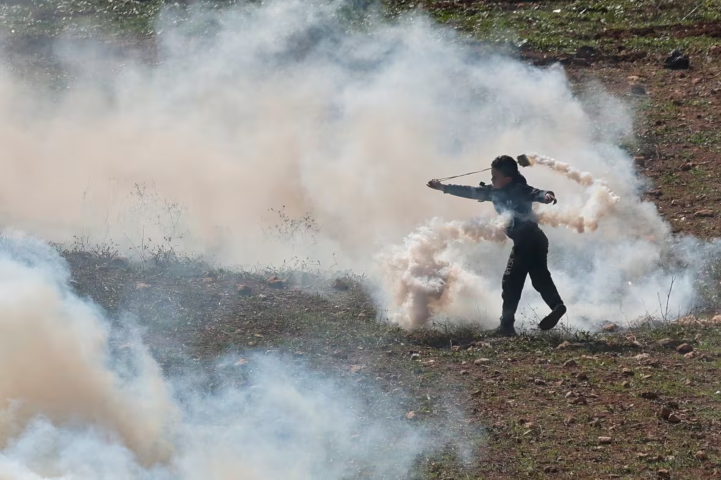
In Beit Dajan, situated east of the occupied West Bank city of Nablus, a Palestinian youngster throws back a tear gas canister at Israeli soldiers amid confrontations following a protest opposing the formation of Israeli outposts. This incident occurred on February 10 and was captured by Jaafar Ashtiyeh for AFP/Getty Images.
In a recent incident during Israel's offensive in Gaza, three unarmed Israeli hostages, waving white flags, were mistakenly killed by Israeli soldiers. The Israeli military acknowledged the incident, stating it was against their rules of engagement. However, human rights groups express concerns over the lack of accountability when Israeli forces kill Palestinian children in the occupied West Bank.
According to the UN's Office for the Coordination of Humanitarian Affairs (OCHA), there have been over 100 such killings this year, marking the highest toll on record. These organizations argue that Israeli authorities fail to adhere to international protocols, considering lethal force often disproportionate to the perceived threat posed by children during military operations.
Ori Givati, advocacy director at Breaking the Silence, an organization founded by IDF veterans critical of Israel's occupation, notes the rarity of IDF members facing consequences for civilian killings. Givati, a former combat soldier, believes this lack of accountability has fostered a permissive atmosphere for using lethal force against civilians, including children.
The killings in the West Bank are often attributed to counterterrorism activities. Two recent victims, eight-year-old Adam Samer Al-Ghoul and 15-year-old Basil Suleiman Abu Al-Wafa, were shot during an Israeli raid in the Jenin refugee camp. The IDF, while not acknowledging involvement in these specific cases, cited "counterterrorist activity" and responded to alleged attacks on their forces.
Human Rights Watch (HRW) has criticized the military's response to incidents involving Palestinian teenagers, emphasizing the disproportionate use of force. Bill Van Esveld from HRW argues that military policies often allow soldiers to "shoot first and ask questions later."
Israel's permission for its forces to shoot at Palestinians throwing rocks or firebombs, even when fleeing and no longer an immediate threat, raises further concerns. International protocols, including the Optional Protocol to the Convention on the Rights of the Child and the Geneva Conventions, emphasize the protection of children in armed conflict, regardless of their involvement.
Khalid Quzmar, director of Defense for Children International — Palestine (DCI-P), asserts that even minors actively involved in the conflict should be treated as victims. However, the Israeli government designated DCI-P and other Palestinian human rights groups as terrorist organizations in 2021, a move rejected by DCI-P.
Recent events, including attacks on October 7 and Israel's Gaza offensive, have heightened tensions in the West Bank, leading to increased incidents involving Israeli soldiers and settlers. More than half of the recorded killings of Palestinian children this year in the West Bank occurred after October 7, according to OCHA.
Quzmar highlights the high risk faced by children, advising them to stay within their neighborhoods to avoid being in harm's way. He points to the case of Mohammed al-Tamimi, a two-and-a-half-year-old shot in the head by Israeli gunfire, illustrating the challenges and dangers faced by Palestinian children.
While some incidents result in acknowledgment of culpability, studies by Israeli human rights organizations, such as Yesh Din, indicate a low rate of indictments against Israeli forces. Only a fraction of complaints related to killing Palestinians during military operations led to investigations, with lenient sentences reported.
Givati believes that holding specific soldiers or officials accountable for civilian killings could trigger a chain reaction, prompting broader questions about the ongoing occupation. This, he suggests, may lead to difficult discussions for Israel about the continuation of the occupation.















